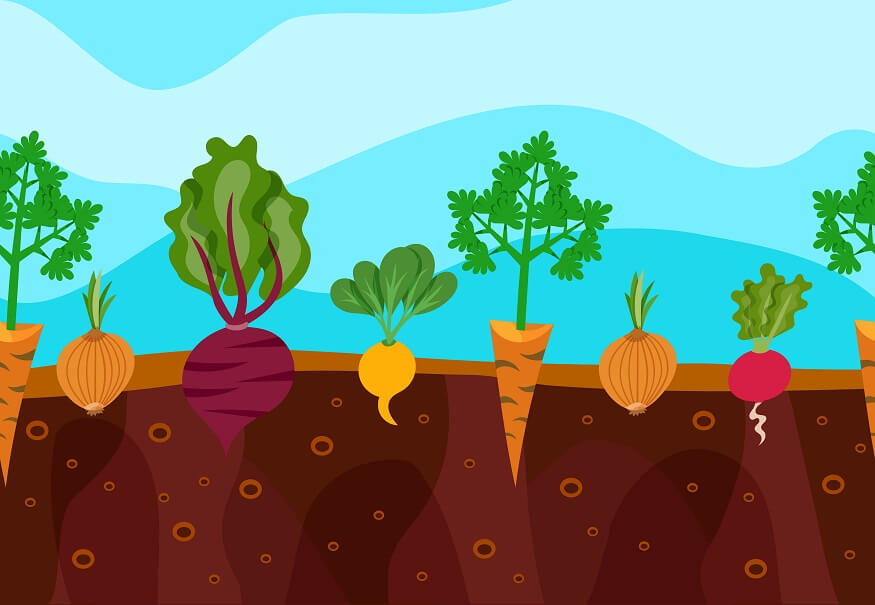Fruits and vegetable consumption play a key role in maintaining health in various ways. Consuming a balanced nutritious diet that includes the nutrients found in these foods can positively affect our blood pressure while also reducing the risk of heart related issues and strokes. Moreover, maintaining an unbalanced diet can contribute to a risk of developing eye diseases and alleviate other issues. Consuming vegetables can have a positive impact on blood sugar levels which is beneficial for managing appetite. Now let’s delve deeper into the advantages of consuming root and stem vegetables to understand their benefits better.
What Are Root Vegetables?
To begin with root vegetables are underground plant parts eaten by humans as food. Although botany distinguishes true roots from non-roots, the term “root vegetable” is applied to all vegetable types in agricultural and culinary usage. Root vegetables are mainly storage organs, which are enlarged to store energy in the form of carbohydrates.
Benefits of the following Root and Edible root Vegetables:
- Beets: Beets contain an amount of folate (also known as vitamin B9) which supports the growth and functioning of our body’s cells. Folate plays a crucial role in preventing damage to blood vessels thereby reducing the risk of heart diseases and strokes. Additionally, beets are naturally abundant in nitrates that convert into nitric oxide within our bodies which improves cardiac health, enhances performance during exercise and improves respiratory response.
- Carrots:
- Radishes:
- Rutabaga:
- Turnips:
- Sweet Potatoes:
- Parsnips:
- Celeriac (Celery Root):
- Yams:
Carrots are packed with beta-carotene. This is a compound that our bodies convert into vitamin A. This essential nutrient plays a role in maintaining the health of our eyes. Beta carotene acts as a shield against the sun’s rays. Additionally, they can decrease the likelihood of developing cataracts and other eye-related problems. Yellow carrots have lutein, which is also good for your eyes but not commonly found in India.
It is a great source of sulforaphane. Like any other members of the brassica family, radishes supply a compound that can be converted to sulforaphane. It is extremely good for heart health and it is an amazing source of antioxidants. It supports liver function and digestion.
Rutabagas are packed with a wealth of antioxidants, including carotenoids as well as vitamins C and E. These antioxidants play a role in combating oxidative damage to our cells and safeguarding us against other chronic health issues. By fortifying our system and shielding our organs from radicals they contribute to our overall wellbeing and vitality.
These are a cruciferous vegetable, they have multiple health benefits such as they boast an impressive nutritional profile, having bioactive compounds such as glucosinolates, supporting and aiding blood sugar control, which in turn protect us against harmful bacteria, and provide anti-inflammatory effects.
Bursting with vibrant orange hues, sweet potatoes are nutrient powerhouses. Loaded with beta-carotene, vital for eye health, they also offer a rich supply of vitamins and fibre, bolstering immunity and promoting optimal digestion for a holistic approach to well-being.
With a mild, slightly sweet flavour, parsnips not only add variety to your plate but also boast significant health benefits. High in fibre, these root vegetables support digestive health, while their antioxidant content contributes to overall well-being by neutralizing free radicals and supporting immune function.
Beneath its knobby exterior, celeriac hides a treasure trove of health-promoting compounds. Rich in antioxidants and essential vitamins, this root vegetable promotes heart health by regulating blood pressure and cholesterol levels. Additionally, it fortifies the immune system, providing a flavorful boost to your well-rounded diet.
Beyond their delicious taste and versatility in the kitchen, yams offer a nutritional punch. A reliable source of fibre aids digestive health, while potassium contributes to a healthy heart. Packed with vitamin C, yams bolster immunity, making them a valuable addition to a balanced diet that supports overall well-being.
Those were some examples and health benefits of edible roots. Now, mentioned below are some of the healthiest root vegetables to add to your daily diet.
- Onions:
- Ginger:
- Garlic:
- Fennel:
Besides onions being among the very popular root vegetables, they serve as a staple ingredient in many cuisines. They have many antioxidants, which help with blood sugar levels. They also improve digestive health and are loaded with nutrients. Onions possess properties that can reduce inflammation and are an excellent source of vitamin C.
It helps in better digestion because ginger helps to speed up the digestion process and empty your stomach more quickly. It improves immunity. It alleviates PMS Symptoms. It Relieves nausea and upset stomach and reduces pain. It also helps with healthier skin.
It can boost our body’s immune system and has loads of antibiotic properties. It is known for its capacity to lower blood pressure and decrease cholesterol levels.
It helps to maintain a healthy heart and is a good source of fibre as well as heart-friendly nutrients like potassium and folate, vegetables like fennel may support heart health. Fennel also promotes healthy skin because it has great anti-inflammatory properties.
If you have just started learning about them or you know about it all along and have been savouring them your whole life, stem vegetables can help in several ways one of which is to increase your vitamin, nutrient, and fiber intake. They also help reduce kitchen waste. This can definitely be considered as a win-win situation for mindful eaters everywhere.
Some examples of stem vegetables are asparagus and kohlrabi whereas the term “root crop” refers to any plant structures that grow underground. Interestingly some root crops are actually stems. Root crop vegetables encompass a variety of options such as potatoes, cassava, beets, carrots, rutabagas, sweet potatoes, turnips, radishes, yams, parsnips and horseradish. Among the bulb vegetables are garlic, leeks, and onions.
The stalks and the stems of leafy green vegetables mainly contain the same nutrients as the leafy part itself. People often question whether crushing or cutting the stalks and stems of leafy greens would affect their value. However, the reality is that there would be no alteration to the composition. These greens are abundant in vitamins, minerals and fibre making them an essential addition to our meals.
At EuroSchool we ensure every student learns about the benefits of vegetables and all the goodness that is power-packed in root plants and all other kinds. We promote healthy eating habits that include good soups and other vegetable-based cuisine. Making food interesting for children by letting them learn about different types of vegetables. We ask parents to encourage children in activities that include them in a meal-making or a snack-making routine.










